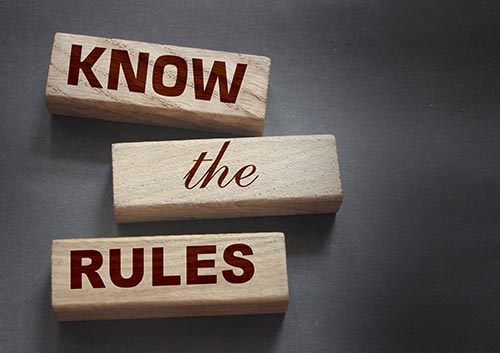
Section 1031 refers to the statute which appears in the Internal Revenue Code. The interpretation and requirements for completing an exchange according to Section 1031 have been clarified by the creation and adoption of a "safe harbor" by the IRS. Complying with the safe harbor regulations allow taxpayers to complete their exchanges with confidence. It is imperative to satisfy all of the conditions of the safe harbor regulations in order to defer the capital gain taxes from your sale. Following these 1031 exchange rules ensures the success of your transaction. The following provides a brief overview of the conditions and steps in an exchange.
To learn more about the 1031 exchange rules set forth by the IRS or to get started developing your strategy, contact us today online or by phone at 314-822-8100.
What Are the Rules of 1031 Exchanges?
1. Like-Kind Property
Both the property being sold (the "Relinquished Property") and the property being purchase (the "Replacement Property") “like-kind.” Like-kind is defined as property used in a trade or business or held for investment. It is not the character of the property that is relevant (e.g., an apartment building or single family unit) it is the use that matters. For example, the apartment building could be exchanged for raw land. The key is that both the relinquished and replacement property must be considered: 1) real property interests; and 2) held for use in a trade or business, or held for investment.
2. Same Taxpayer Rule
A threshold question is ‘who owns the real estate being exchanged’? Section 1031 exchange rules require that the taxpayer that owns the Relinquished property must be the same taxpayer that acquires the Replacement property in the exchange. Who owns the property is typically an issue governed by state law where the real estate is located.
3. Holding Time
The technical definition of "like-kind" states that the real property must be "held" for use in a trade or business or "held" for investment. This refers to the period of time the taxpayer has owned the real property. There’s no minimum “holding period” defined in the 1031 exchange rules. In general, the longer the holding period the more it appears that the property will qualify as like-kind.
4. Equal or Greater Value

If the goal of the exchange is 100% tax deferral, the taxpayer must 1) acquire Replacement property that is equal or greater in value than the Relinquished property; and 2) have equal or greater net equity; and (3) replace debt on the relinquished property with debt or outside cash on the Replacement property. Failure to meet either or both of these conditions may result in the taxpayer realizing some gain as part of the transaction.
5. “Boot” Consideration
Any property received in the exchange, other than like-kind property, is considered “Boot.” Boot can be cash, relief of debt, or property that is not like-kind. As stated in 1031 exchange rule #4 above, it is important to consider the financial aspects of the sale and purchase to determine whether any Boot will be realized.
6. 45-Day Identification Period
Beginning with the day after closing the sale of the relinquished property, the taxpayer has 45 calendar days to identify potential replacement properties. The identification must be: 1) in writing; 2) signed by the taxpayer; and 3) the properties must be unambiguously described (for example, either by a legal description or property address). Any property acquired during the initial 45-day period does not have to be identified.
7. 180-Day Purchase Rule
Beginning with the day after closing the sale of the relinquished property, the taxpayer has 180 days or the due date for the taxpayer’s return, whichever comes first to close on the purchase of one or more of the identified replacement properties. A taxpayer must be careful to only acquire identified property.
8. Qualified Intermediary & When to Set Up the Exchange
An exchange must be in place prior to the closing on the sale or purchase of any property which is intended to be part of the exchange. This is accomplished by entering into an exchange agreement. The exchange agreement provides that the taxpayer intends to conduct an exchange of like-kind properties and limits the use and access to the sale proceeds from the relinquished property during the exchange period. A "Qualified intermediary", also known as an "Accommodator" or "Facilitator" is a party to the exchange agreement and must be used to hold the sale proceeds during the exchange process.
Why Understanding the 1031 Exchange Rules is Crucial
While the safe harbor regulations have provided a reliable and efficient means of obtaining the tax deferral under Section 1031, there are many exceptions to the general 1031 exchange rules above. The specific facts of each transaction are important to understanding when these exceptions may apply and they can spell the difference between a successful tax-deferred exchange and a failed exchange. A Having a solid grasp of the rules of a 1031 exchange provides several benefits, including the following:

- Informed Decision Making: Armed with knowledge of the 1031 exchange process, investors can make decisions that align with their long-term financial goals while ensuring compliance with IRC Section 1031.
- Tax Savings: Adhering to the 1031 exchange rules allows investors to maximize tax deferment, leading to substantial savings.
- Investment Growth: A successful 1031 exchange can allow for reinvestment of the full sale amount, fueling potential growth and increasing the overall return on investment.
- Avoiding Pitfalls: Understanding the rules ensures investors can sidestep common pitfalls, like missing identification deadlines or unintentionally receiving taxable “boot.”
At 1031 Exchange Intermediaries, we emphasize the importance of these rules, ensuring our clients are well-equipped to navigate the 1031 exchange landscape.
Contact 1031 Exchange Intermediaries Today to Discuss Your 1031 Exchange
The 1031 exchange is a powerful tool for investors to defer capital gains taxes, but it’s essential to understand and follow all of the rules of a 1031 exchange meticulously. If you have questions or need more detailed advice, contact our expert 1031 exchange intermediary team.

